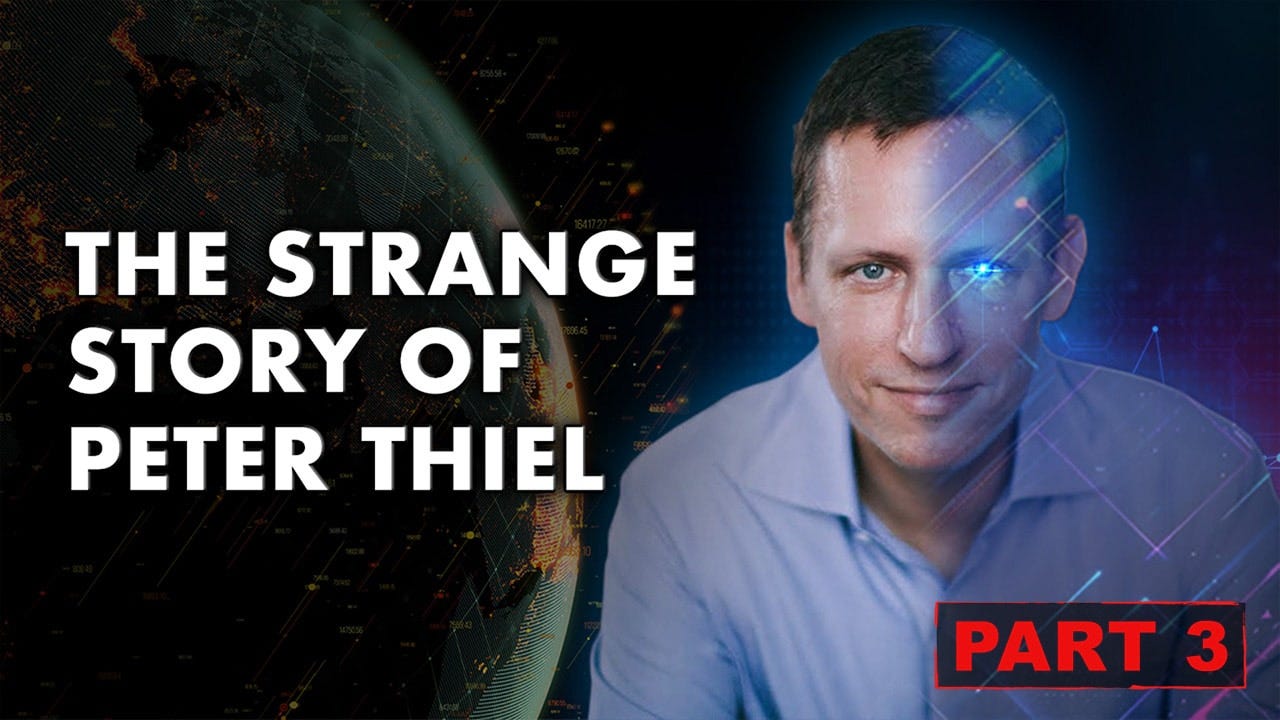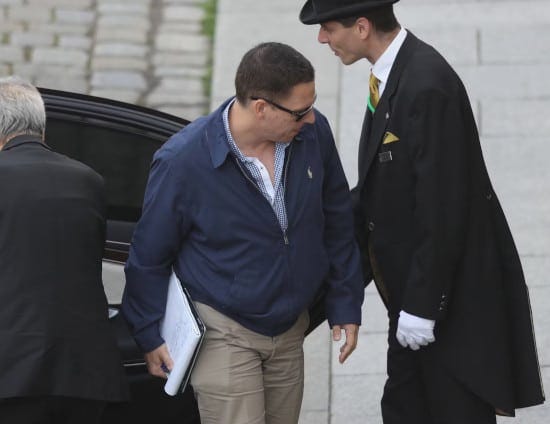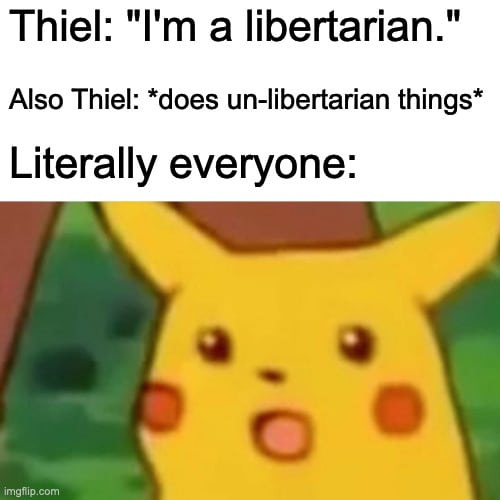If you've read "The Strange Story of Peter Thiel," then you'll know all about how this deep state-connected "PayPal Mafia" don rose to financial prominence on the back of his remarkable ability to found companies that either undergird the digital financial infrastructure (PayPal) or act as cutouts for the intelligence agencies (Palantir).
And if you've read "Buying Politicians is Easy," then you'll know all about how Thiel has leveraged his ill-gotten wealth to buy himself real-world political clout. And you'll also know all about how he has wrapped the silicon tentacles of next-gen military contractors like Palantir, Clearview AI, Anduril and other Thiel-founded, Thiel-funded and Thiel-adjacent companies around the globe by signing contracts with foreign militaries.
But after learning all of this, we're still left with some important questions. Namely:
What (beyond the sweet smell of deep state blood money) motivates Peter Thiel?
What ideology does he hew to?
What is his endgame?
In other words: Who is Peter Thiel and what is his real role in the deep state?
Let's find out.
Steering Bilderberg
Yes, as we learned last week, buying politicians is a trivial pursuit for a power-seeking billionaire like Peter Thiel.
And perhaps that's the point. Those of us who understand how power really operates in our modern "liberal democracies" know that real power is not to be found in any political office—even the Oval Office. Thiel himself has admitted as much:
I think calling our society a democracy, whatever may be good or bad about democracy, is very, very deeply misleading. We’re not a republic. We’re not a constitutional republic. We are actually a state that’s dominated by these very unelected, technocratic agencies.
Or, as BlackRock CEO Larry Fink put it even more starkly last month:
I'm tired of hearing this is the biggest election in your lifetime. The reality is over time, it doesn't matter. [. . .] We work with both administrations and are having conversations with both candidates.
The true measure of Thiel's position in the deep state, then, is not the extent to which he will wield power in the coming Trump administration through his bought-and-paid-for minion, J. D. Vance—significant as that power might be.
Rather, the measure of Thiel's deep state status comes from his role in the premiere deep state institution: the Bilderberg Group.
The Bilderberg meeting is, of course, one of the yearly highlights of any budding globalist's calendar. The annual conference brings together 150 or so of the wealthiest and most influential businessmen, financiers, tech oligarchs, heads of state, military planners, globalist super-gophers and royalty from Europe and North America (and, increasingly, from around the world) to conspire for three days in total, closed-door secrecy at a five-star resort somewhere within driving distance of a major European or North American capital.
To be invited to Bilderberg once is surely a sign that a young globalist's deep state star is in the ascendant. To be invited a second time is a signal that one has arrived. But then there is the crème de la crème of this global cabal—the steering committee members who organize the conference and decide who will or will not be invited to each year's meeting. Past steering committee members have included such deep state stalwarts as David Rockefeller, Joseph Retinger, Prince Bernhard, Henry Kissinger and Edmond de Rothschild. And, as you might have guessed, Peter Thiel sits on the current Bilderberg steering committee along with Alex Karp, the CEO of Thiel-founded Palantir Technologies.
Given the wall of secrecy that surrounds Bilderberg—remember when Dan Dicks and Luke Rudkowski got arrested for merely approaching members of the steering committee in a hotel lounge in Copenhagen in 2014?—the precise details of when and how Thiel acceded to the steering committee are unknown. We can definitively state that he has been a member of the steering committee since at least 2019 (the point at which the earliest backup of the official steering committee member list was made on The Wayback Machine), but beyond that it's impossible to tell when he first joined the committee.
However, we do know that since 2010 Thiel has been a Director of the "American Friends of Bilderberg"—a group that tasks itself with "organizing and sponsoring conferences which study and discuss significant problems of the Western alliance" and with "collaborating on the Bilderberg Meetings held in Europe and North America" and whose board has boasted such luminaries as Henry Kissinger, David Rockefeller, Richard Perle, James Wolfensohn and Vernon Jordan.
We also know that:
Thiel has been on the participant list for Bilderberg every single year since the Bilderberg Group started releasing official participant lists in 2007;
Karp has joined Thiel as a Bilderberg invitee each year since 2012; and
fellow Thielversians are frequent invitees to the Bilderberg festivities.
Those Thielversians and PayPal mafia members who have made appearances at Bilderberg under Thiel's steering committee reign include:
Reid Hoffman, a founding member of PayPal's board of directors who has a long history with Thiel;
Palmer Luckey, the teenager who created the Oculus VR headset that Thiel funded into existence and who now runs the Thiel-funded Anduril Industries, which makes (as National Propaganda Radio puts it) "AI weapons for Ukraine"; and
Kevin Harrington (the managing director of Thiel Capital).
Unsurprisingly, the only journalists to ever directly question Thiel about his participation at Bilderberg were a gaggle of independent reporters who braved arrest and assault to cover Bilderberg 2016. Questioned by Luke Rudkowski of We Are Change about the seeming contradiction between his professed "libertarian" values and his participation in a closed-door meeting conspiring with government officials and their financial backers, Thiel served up a hefty portion of this awkward word salad:
Or, transcribed:
I believe that it's always important to exchange views with people . . . uh, no matter what their perspectives are. . . . Uh, I believe that uh, I'm, you know, I . . . I . . . I think that, uh . . . I think that we have a lot of problems in our society and we need to be . . . uh finding ways to talk to people who need to find ways to talk to people . . . uh, where not everything is completely transparent. Libertarianism is not synonymous with radical transparency. That's often an argument that the Stasi would make in East Germany, where, uh, everything had to be monitored by, uh, by society. And I think often you have the best conversations, uh, in smaller groups where not everything is being monitored. And that's how you can have very honest conversations and how you can think better about the future. Thank you very much.
<sarc>Uh, I . . . I . . . I think that that's a very, a very, uh, candid and frank statement by, uh, an individual who . . . uh, is not thinking about what platitudes to mouth, and uh . . . I completely agree with his, uh, with his assessment.</sarc>
More seriously, whether or not libertarianism is synonymous with "radical transparency," it is certainly not synonymous with financiers, heads of state, government contractors and other taxpayer-funded oligarchs conspiring behind closed doors about how best to steer the deep state, arm militaries around the globe and surveil citizens in the name of political power and personal profit.
So, where on earth did people get the idea that Peter Thiel is a libertarian, anyway?
Why, from Peter Thiel, of course!
The (Mis-)Education of a (Fake) Libertarian
In 2009, just as he began his dive into the political waters, Thiel penned "The Education of a Libertarian," an essay in which he declares in no uncertain terms that he is indeed a libertarian and has been since his youth.
He devotes the bulk of the essay to explaining how he spent his student days at Stanford trying to bring about a libertarian awakening through political activism but has since learned that political activism is useless and that the real solution is to be found not in engaging in politics but in escaping politics.
He concludes:
I suspect that the mode for escape must involve some sort of new and hitherto untried process that leads us to some undiscovered country; and for this reason I have focused my efforts on new technologies that may create a new space for freedom.
And what areas of technological advancement has Thiel chosen to focus his supposedly "libertarian" efforts on? He names three: cyberspace, outer space and seasteading.
(Yes, that's "seasteading," as previously promoted by Milton Friedman's grandson, Patri, who has since ditched the seasteading dream to start a new venture capital firm—with seed money from Peter Thiel, naturally . . . but that's a whole other story.)
Although the essay seems fairly old hat to readers of The Corbett Report, it had two important effects at the time.
Firstly, Thiel's lament that "the extension of the franchise to women" has "rendered the notion of 'capitalist democracy' into an oxymoron" gave plenty of pundits fodder for their obligatory "Look at this disgusting libertarian!"-style editorials. In fact, it continues to this very day to provide easy cut-and-paste editorials for finger-wagging, context-destroying online pundits despite Thiel's attempts at damage control.
Secondly, the essay cemented in the minds of the lazy left-wing punderati that libertarianism is . . . well, whatever evil thing they say it is. After all, Peter Thiel is a libertarian ("You see! He says so himself! What other evidence do you need?"), ergo all libertarians are billionaire, taxpayer-funded, surveillance-supporting deep state oligarchs.
See Wired's "The Libertarian Futurism of Silicon Valley Billionaire Peter Thiel" or "The Libertarian Logic of Peter Thiel" or Mannwest's "Peter Thiel: The articulate libertarian" for some prime examples of this phenomenon. Then enjoy laughing at Reason (no stranger to the concept of fake libertarianism) and its shocked pikachu face article, "Wait, Wasn't Peter Thiel a Libertarian?"
This particular form of journalistic idiocy reached its zenith with Inverse's 2016 article on Thiel's Bilderberg membership. In that article, crack Inverse reporter Sarah Sloat somehow manages to both decry Thiel's membership in the conspiratorial Bilderberg group and simultaneously denigrate "conspiracy theorists" for being concerned about said group. She then ends her think piece with the most mind-meltingly stupid statement ever written:
Thiel's allegiance to Bilderberg, which seems to have a libertarian bent, makes sense given his wealth and involvement in companies like Palantir Technologies that collect data on civilians.
Only the intellectually challenged mind of an ideologically blinded and philosophically illiterate zealot—that is, someone for whom "libertarian" is simply a synonym for "anything I don't like"—could possibly conclude that Bilderberg "seems to have a libertarian bent," let alone that that libertarian leaning is reflected in "companies like Palantir Technologies that collect data on civilians" on behalf of the government.
More honest writers are able to admit what should be glaringly obvious to all by now: Thiel is not, in fact, a libertarian, despite what he claims. Even Thiel's biographer, Max Chafkin, is forced to concede that "Thiel was, after 9/11 anyway, no longer much of a libertarian, if he'd ever been one in the first place."
Gee, ya think?
Yet, if we read "The Education of a Libertarian" even more closely, we garner something genuinely valuable from it: a clue to Thiel's actual ideology and his actual motivation. It comes right at the beginning of the essay, where he lays out his own highly idiosyncratic definition of the term "libertarian." According to Thiel:
I remain committed to the faith of my teenage years: to authentic human freedom as a precondition for the highest good. I stand against confiscatory taxes, totalitarian collectives, and the ideology of the inevitability of the death of every individual. For all these reasons, I still call myself “libertarian.”
Ah yes, those classical libertarian values: Opposition to confiscatory taxes! Opposition to totalitarian collectives! And . . . opposition to "the ideology of the inevitability of the death of every individual"?
Wait, what?! What on earth is "the ideology of the inevitability of death for every individual," and what does that have to do with libertarianism, anyway?
Our instinct might be to skim past this line and to chalk it up to Thiel's eccentric, nerdy, sci-fi-obsessed character. But don't. This weird line tells us something important about who Peter Thiel really is.
Go paid at the $5 a month level, and we will send you both the PDF and e-Pub versions of “Government” - The Biggest Scam in History… Exposed! and a coupon code for 10% off anything in the Government-Scam.com/Store.
Go paid at the $50 a year level, and we will send you a free paperback edition of Etienne’s book “Government” - The Biggest Scam in History… Exposed! OR a 64GB Liberator flash drive if you live in the US. If you are international, we will give you a $10 credit towards shipping if you agree to pay the remainder.
Support us at the $250 Founding Member Level and get a signed high-resolution hardcover of “Government” + Liberator flash drive + Larken Rose’s The Most Dangerous Superstition + Art of Liberty Foundation Stickers delivered anywhere in the world. Our only option for signed copies besides catching Etienne @ an event.










He may be a “libertarian” when it comes to himself. But like so many of the billionaire class who claim that they are only trying to help the cause of freedom or humanity or health or education or finance, etc….it comes down to “rules for thee but not for me.” And at this point, especially after the past 5 years, this philanthropath class have demonstrated that they feel the ends justify the means in ushering in their half baked delusional notion that they can construct and program society as if it is one of their computer/digital programs. Sheer hubris.